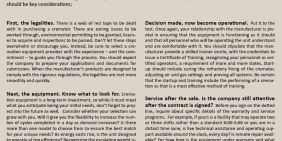The rise in cremation rates is a game changer for most of us in the death-care profession. After decades, centuries really, of burial as the most frequently chosen method of disposition, the increasing trend toward cremation is shifting how we operate our businesses. While some struggle with the transition, others explore and act on the potential which it offers.
Consider this basic fact: as the volume of cremation increases, the need for businesses that perform cremations increases. And for some, therein lies the opportunity. Are you one of them? Perhaps you are the owner of a funeral home and use an outside service to perform your cremations. Does it make good business sense to bring cremation in house? You may be an entrepreneur trying to determine whether establishing a crematory is a wise venture. I will share with you factors that should be key considerations;
First, the legalities.
There is a web of red tape to be dealt with in purchasing a cremator. There are zoning issues to be worked through, environmental permitting to be granted, licenses to acquire and inspections to be passed. Don’t let these steps overwhelm or discourage you. Instead, be sure to select a cremation equipment provider with the experience – and the commitment – to guide you through the process. You should expect the company to prepare your applications and documents for
submission. When the manufacturer’s products are designed to comply with the rigorous regulations, the legalities are met more smoothly and quickly.
Next, the equipment.
Know what to look for. Cremation equipment is a long-term investment, so while it must meet what you anticipate being your initial needs, don’t forget to project into the future as well. Consider whether your selection can grow with you. Will it give you the flexibility to increase the number of cycles completed in a day as demand increases? Is there more than one model to choose from to ensure the best match for your unique needs? As energy costs rise, is the unit designed to operate at top efficiency? Recognizing the escalating weight issues of your prospective cases, can the equipment accommodate obese individuals?
Time for your homework.
When was the last time you were in the market for a product and the sales person didn’t tell
you that his product was the finest, the customer service was outstanding and the price couldn’t be beat? So how do you determine if there is truth in those claims? Talk to your peers who
own and operate the product. They are on the frontline and will tell you if the company is proactive in ensuring customer satisfaction. Whether the service team is easily accessible and always responsive. And, importantly does the unit operate easily and offer all the needed features.
Decision made, now become operational.
Put it to the test. Once again, your relationship with the manufacturer is pivotal in ensuring that the equipment is functioning as it should and that all personnel who will be operating the unit understand and are comfortable with it. You should stipulate that the manufacturer provide a skilled trainer onsite, with the credentials to issue a Certificate of Training, recognizing your personnel as certified operators, a requirement of more and more states. Startup should include curing the refractory lining of the cremator, adjusting air and gas settings and proving all systems. Be certain that the startup and training include the performing of a cremation as that is a most effective method of training.
Service after the sale.
Is the company still attentive after the contract is signed? Before you sign on the dotted line, inquire about specific details of the warranty and cremator service programs. For example, if yours is a facility that may operate two or three shifts rather than a standard 8:00-5:00 or you are in a distant time zone, is live technical assistance and operating support available around the clock, every day? Is remote repair available? For how long is the equipment under warranty and what specifically is warranted? Remember that an accurate sense of how well the manufacturer performs after the sale is gotten not from the manufacturer but from the equipment users – people just like you.
Becoming a cremation provider or expanding your current crematory is a significant step. Don’t go it alone. The right company will do more than sell you their product – they will assist you in determining whether a cremator makes smart business sense for you and, if it does, will guide you every step of the way and be there for you after the sale.







